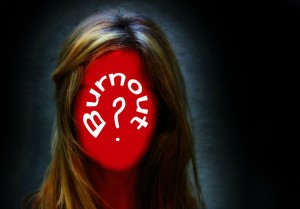
At some point in your career, have you ever said to yourself, “I’m burned out”? Sure, any job can lead to frustration from time to time which can cause temporary negative feelings about one’s work. Negative feelings which persist and get worse with time, though, can actually lead to something called job related burnout. But, what does it really mean to be burned out?
Research conducted by Dr. Christina Maslach back in the early eighty’s identified the three principle hallmarks of job related burnout which are emotional exhaustion, depersonalization and a lack of a sense of personal accomplishment. In varying degree, some combination of these will always be present when someone is burned out at work.
Let’s take a look at them one-by-one.
- Emotional Exhaustion – It is a feeling of being emotionally depleted to the point where you feel you can no longer give of yourself at an emotional or psychological level to your company or the people you serve. KEYWORD: Exhaustion
- Depersonalization– The development of negative and cynical feelings leading to a callous and dehumanized perception of patients, clients or customers which further leads to the view that they are somehow deserving of their problems and troubles. KEYWORD: Cynicism
- Lack of a Sense of Personal Accomplishment – You feel so little reward from what you do there is a tendency to evaluate yourself in negative terms which leads to dissatisfaction and unhappiness in your work creating a lack of a sense of personal accomplishment. KEYWORD: Inefficacy
Men and women will register these slightly differently. Women will usually hit all three of these and in the order presented. Men will usually get cynical first followed by emotional exhaustion. Men may or may not hit the third hallmark of a lack of a sense of personal accomplishment. Most men will feel their work always has some meaning, at least to them.
One thing is certain, if an individual can identify the presence of these hallmarks they are either burning out or burned out. I don’t have to tell you the costs of job related burnout are devastatingly high, not only for the individual employee but the organizations they work for as a whole.
I should know, I have been burned out before as a family physician. About five years ago I had hit all three hallmarks of burnout. I felt horrible. I even felt guilty for feeling the way I felt. I didn’t know at the time exactly what was wrong. I just knew some things had to change. I would later discover I was suffering from job related burnout and I began to study it in depth.
I found out individuals who become burned out are at risk for poor job performance, chronic unhappiness, increased irritability, depression, anxiety and mood swings. Even suicidal thoughts, suicidal actions, alcoholism and drug abuse are documented consequences of job burnout. Bottom line, if you are burned out you will never feel you are living a life of purpose with passion.
Besides the obvious consequences of these, there is also a potential for a great loss of knowledge, expertise and creativity. A person’s vitality and creative force will be stymied or destroyed by burnout. Someone’s passion and sense of purpose can be completely subverted. Physicians have quit medicine, CEO’s have left the corporate world and experts in every profession have abandoned their chosen fields of endeavor over job burnout, all of which are tragedies.
For organizations, failure to address burnout in the workplace can result in a dysfunctional workforce, high staff turnover and inferior products or services. The result is a type of internal rot, not to mention the financial devastation this can bring.
The great news about burnout is it’s 100% reversible, treatable and preventable. When I realized I was suffering from job burnout I made some very simple changes right away which made all the difference in the way I felt toward myself, my patients and my profession. I was able to attain the state opposite of burnout – Engagement.
The key is recognizing the signs and symptoms of burnout and how it differs from job stress. Once burnout is recognized, steps can be taken to ameliorate or eliminate the job-employee mismatches which lead to job related burnout.
Can you identify with any of these – emotional exhaustion, depersonalization or a lack of a sense of personal accomplishment – within yourself or your organization? If so, reach out to those of us who know how to reignite and reengage burned out individuals with a renewed sense of passion and purpose.
Call me to discuss at 919-735-0433 (please ask for Fay or Jayme) or for more information —
so basically you are making your living off of exhausted workers now, thus, no more burn out for you. thanks!
Hi Laurie.
Thanks for your comment. Your statement is a rather cynical non-sequitur. It seems to presuppose that everyone with burnout needs to hire a coach. They do not. It also seems to presuppose that in order to get over burnout you must spend money. Also untrue. There are two years worth of posts on my website which can help anyone with burnout and its there for free. Also, there is no sacred knowledge anymore. Everything you want to know about anything is out there on the web now, including the topic of burnout. However, some people with burnout seek help in dealing with it, and want the accountability which coaching offers. So, yes, they can engage with me for a fee. Just so you know, I made my living off of sick people as a family physician for 27 years before I became a coach. If that is how you would like to look at it. I suggest checking you cynicism (depersonalization) dip-stick. You might just be burned out. No charge!